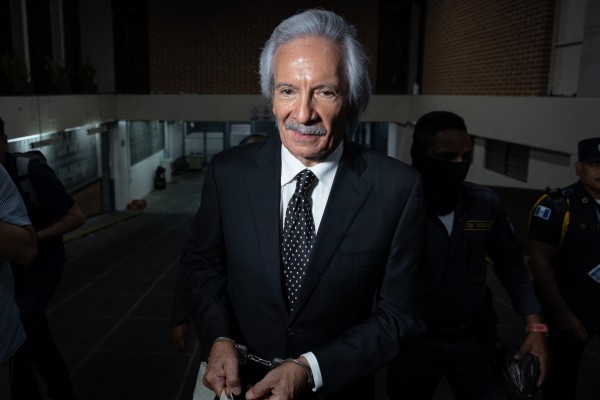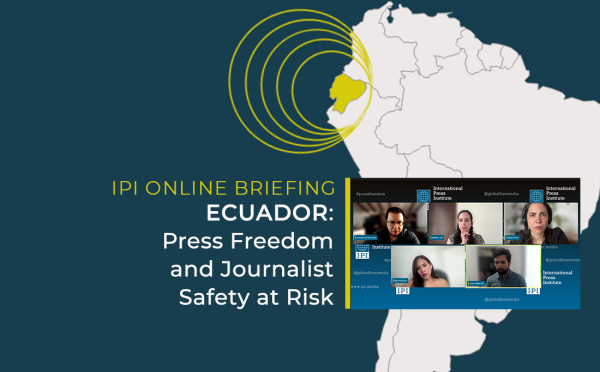An international mission of the Inter American Press Association (IAPA) and the International Press Institute (IPI) is to visit Venezuela from 24-26 November to urge the government and news media there to guarantee and respect freedom of the press during a referendum to be held in the South American country later this month.
The delegation, headed by IAPA President Jack Fuller and IPI Chairman Jorge E. Fascetto, will also be carrying out a resolution of the IAPA’s General Assembly last month in Chicago “to send missions to Venezuela to report on the observance of freedom of expression and freedom of the press in relation to the recall referendum provided under in the Venezuelan Constitution and under agreements promoted by the Secretary General of the OAS, the United Nations and the Carter Center.”
While in Caracas the delegation will meet with Supreme Court Chief Justice Iván Rincón and National Electoral Council Chairman Francisco Carrasqueńo and with representatives of the Television Federation, Radio Chamber and Venezuelan Press Association to stress to them their conviction that press freedom is the only way for citizens to be well informed and be able to make choices.
In addition to Jack Fuller, President of Tribune Publishing Company, Chicago, Illinois, and Jorge Fascetto, Chairman of the Board of El Día, La Plata, Argentina, the mission will be made up of Rafael Molina, Ahora magazine, Santo Domingo, Dominican Republic; Bartolomé Mitre, La Nación, Buenos Aires, Argentina; Edward Seaton, The Manhattan Mercury, Manhattan, Kansas; Sergio Muńoz, Los Angeles Times, Los Angeles, California; Humberto Castelló, El Nuevo Herald, Miami, Florida; John Yearwood, The Miami Herald, Miami, Florida; Gary Marx, Chicago Tribune, Chicago, Illinois; IAPA Executive Director Julio Muńoz and Press Freedom Director Ricardo Trotti.
At the conclusion of its three-day visit to Venezuela, the IAPA delegation will hold a news conference at 12:30 p.m. on Wednesday, 26 November, at the JW Marriott Caracas.
National Electoral Council promises to enforce regulation providing for punishment of any attempt to stage a rally or protest of President Chávez in the event that he uses the television networks during the recall process to undermine this democratic and constitutional activity.
CARACAS, Venezuela (26 November 2003) — A joint delegation of the Inter American Press Association (IAPA) and the International Press Institute (IPI) obtained a commitment by agencies regulating the current recall process in Venezuela that they will ensure the free practice of journalism and will not allow any abuse of freedom of expression and of the press.
The delegation, headed by IAPA President Jack Fuller and IPI President Jorge Fascetto, came to Caracas with the sole objective of urging officials to respect free speech and press freedom during the President Hugo Chávez recall referendum, refraining from any discussion or analysis of politics or possible results of the electoral process.
The IAPA and IPI did, however, take the opportunity to express their concern at repeated violations of freedom of the press and freedom of expression that have been occurring in recent years and which have disrupted the country’s democratic life. This is the second joint delegation of the two organizations to come here in a year, while the IAPA alone has sent five missions to Venezuela during the administration of President Hugo Chávez.
The vice president of the National Electoral Council, Ezequiel Zamora, gave assurances to the delegation that his agency will demand compliance with the regulations governing the recall process and punish those who fail to comply.
Specifically as regards press freedom, Zamora said that the work of journalists and news media and access to information will be safeguarded. As for the question of free speech, he said that the Council is banning rallies and protests, whether for or against, and will stamp on any attempt to stage them while the process is under way. It will also seek to head off any risk of violence that might come about with the aim of undermining this democratic process.
In response to the concern of the IAPA that President Chávez might use national radio and television hook-ups for his own ends, Zamora said that the Council could apply sanctions to the president should he make any reference to the collection of signatures or could even punish him if he were to repeatedly use them in the next few days with the aim of distort the process – even though he might not refer specifically to it.
Supreme Court Chief Justice Iván Rincón assured the delegation that the Court, acting as a natural arbitrator, should there be any complaint about any violation of the process being duly carried out, would enforce observance of the Constitution and would not allow any kind of abuse to undermine freedom of expression and freedom of the press.
Fuller stressed the importance of the recall process, saying it “goes beyond Venezuela.” He explained that throughout the Western Hemisphere there are men and women expecting democracy and freedom of expression to be respected.
During its various meetings that the delegation had with Supreme Court justices and National Electoral Council officials, as well as with the news organizations Venezuelan Press Bloc and Radio and Television Federation, it expressed concern at the impediments to free speech and press freedom.
Among these it mentioned: temporary limits being put on advertising in the media prior to the collection of signatures for the referendum and during the recall process itself; the ambiguity of the wording of the Electoral Council’s regulations with regard to sanctions for non-compliance by the media; government foreign exchange controls that restrict the free flow of information by limiting the productivity of the media, and discrimination in the placement of official advertising.
The delegation also underscored its concern at the danger for democracy should any kind of violence erupt during the collection of signatures, to begin on November 28, and expressed fear that President Chávez might exploit the national broadcast hook-ups.
Fascetto said that the calm air that had prevailed over last weekend during the collection of signatures for a referendum for the recall of 38 opposition congressmen could have been the result of what he called a fictitious strategy that does not properly reflect the violations that have been occurring against the press in the country. He mentioned, however, the fact that the president had not resorted to the national broadcast hook-ups during the weekend and said he hoped a climate of tolerance would prevail so that journalists could carry out their work freely.
The IAPA and IPI declared that they will remain alert to possible violations of press freedom and they plan to send other missions to Venezuela during the recall process, with the aim of guaranteeing the public’s right to know.


